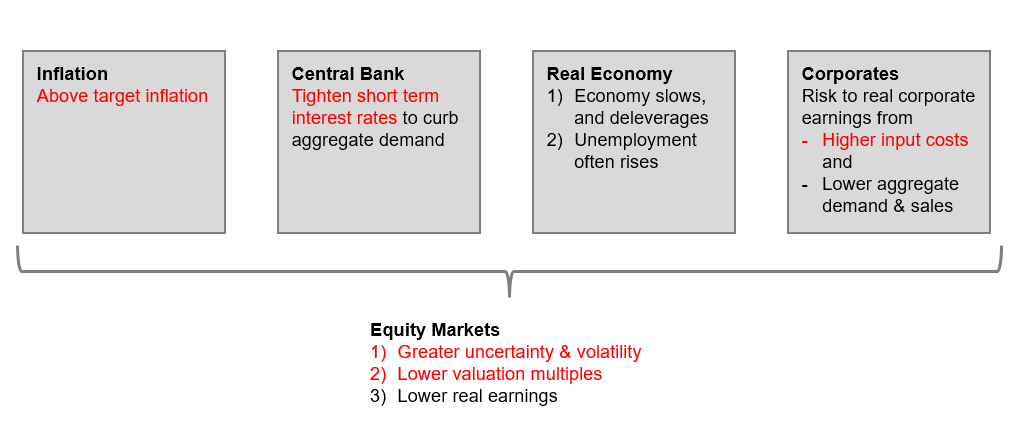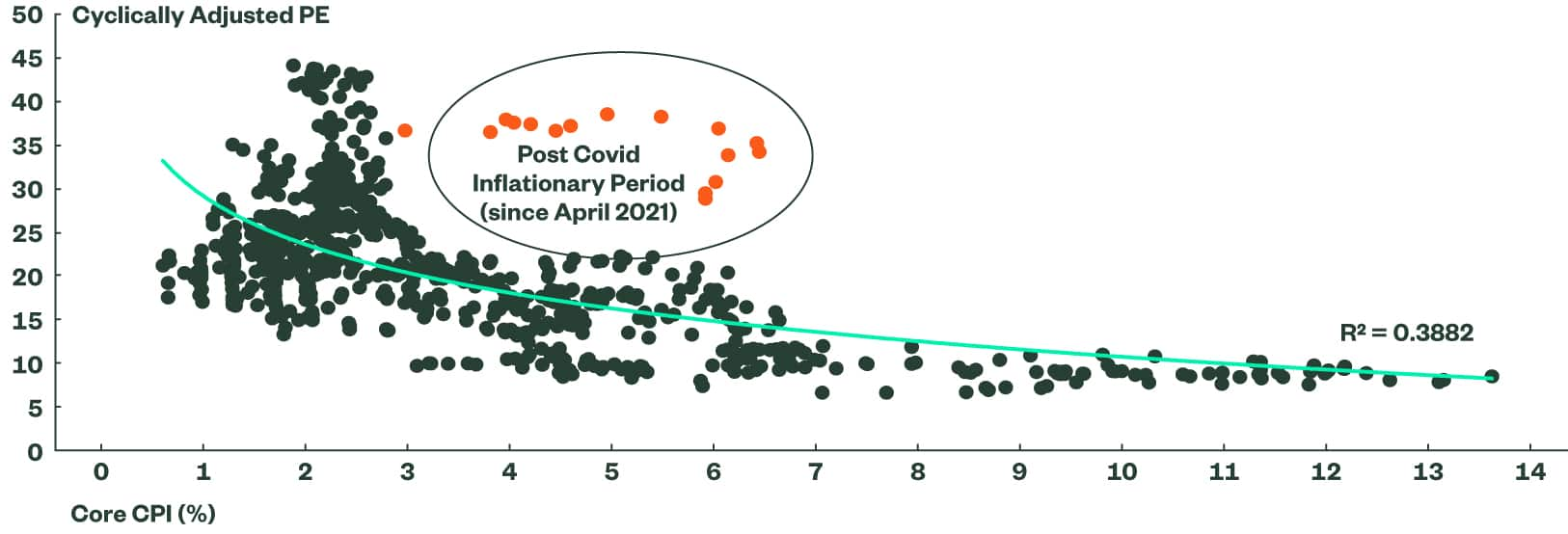Inflation - Why it is such a big deal for equities
Inflation Headwinds Equity Markets
Equity investors are acutely watching developments in inflation expectations and for good reason. Figure 1 outlines the reason inflation is having such a big impact on equites. Above trend inflation results in central banks raising short term interest rates – designed to slow the economy, reduce aggregate demand and rein in inflation. Each cycle is different but it is widely accepted that rising short term interest rates operate with a lag of about 12 months.
Figure 1 below highlights in red the elements of this process that have occurred so far in this cycle. The points in black are yet to play out. So far we have not yet seen any material slowdown in global growth but leading indicators of global growth like the US (10–2 years) yield curve are suggesting this slowdown is coming. So far corporate earnings have only slowed mildly (as discussed in last month’s insight). The majority of companies have been able to pass on higher input costs while demand remains. The real test for corporates will come when demand begins to slow in coming quarters.

We have seen volatility in the equity market and we can expect more volatility. In the current inflation environment there remains increased uncertainty for the key factors in determining company valuations. From a cash flow perspective there is greater risk of lower cash flows in the next few years and greater uncertainty. In terms of the discount rate applied to those cashflows the market is expecting higher discount rates but also greater uncertainty in those interest rates which adds to equity market volatility. Year to date we have seen investors de-rate most companies but especially the longer dated growth companies and those with less certain cashflows. Conversely those with shorter dated and more certain cash flows have outperformed. This is in stark contrast to 2019 and 2020 and much of the last decade which favoured growth companies.
YTD we have seen the MSCI World Index Price to earnings (PE) multiple derate from 18 times back to the longer run average of 15 times. As investors are digesting the new level of interest rates and the increased uncertainty they are more conservative in company valuations. The higher rate environment has taken much of the excessive valuation multiples out of the most speculative parts of the market.
Figure 2 below highlights the relationship between inflation and valuations multiples. Periods of high inflation are associated with lower valuation multiples. This relationship is expected given the negative impacts highlighted in Figure 1 as well as the impact on company valuations from higher rates. Moreover the higher inflation rate and higher interest rate environment is usually associated with more conservative equity valuations.

Source: State Street Global Advisors, Robert J. Shiller as at 31-Jul-2022
CPI = Consumer Price Index
The jury is still out as to whether inflation has peaked or not, but as long as rates remain above central bank target levels, interest rate policy settings are unlikely to remain expansionary. Markets often trade off the change in economic variables but the absolute levels are also important. Stubbornly high inflation is likely to keep central banks hawkish and equity markets volatile until inflation is tamed.
The Bottom Line
Inflation is causing extra volatility and risk for equity markets at the moment for good reason. The inflation headwind is likely to remain until higher rates have done their job of reducing aggregate demand and taming inflation. In this inflationary environment investors are likely to stay more risk averse in both security selection and equity valuations.
Learn more about risk aware investing
For more details on how State Street Australian Equity Fund can play a part in your asset allocation, click the contact button below, or visit our website for more information.
1 topic

Bruce is Head of Active Quantitative Equity - Australia, for State Street Global Advisors. He has over 20 years' experience, covering Australian and global equites, long and short equities as well as global macro strategies.

Bruce is Head of Active Quantitative Equity - Australia, for State Street Global Advisors. He has over 20 years' experience, covering Australian and global equites, long and short equities as well as global macro strategies.
